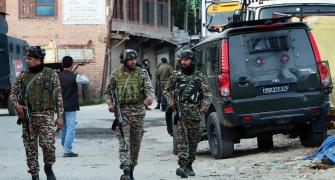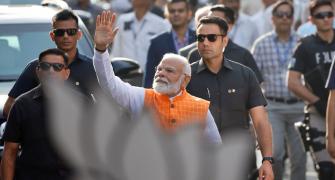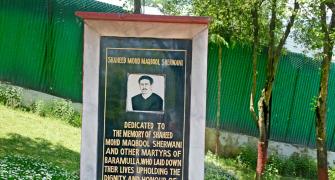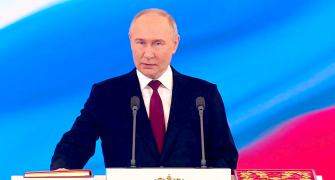Burns -- the Bush administration's anchorperson for the India-US nuclear deal, argued on Tuesday that New Delhi has passed the test with its votes at the International Atomic Energy Agency to isolate Teheran on Iran's nuclear programme.
The Bush administration fears that Congressional suspicions about India's relations with Iran may sabotage the India-US nuclear deal's passage through the US Congress.
Responding to a question at the Carnegie Endowment for International Peace in Washington, DC, which followed a keynote address he delivered on 'US-India Relations: The Global Partnership', Burns said, "I would ask that India be judged by the United States on the same basis that we judge all our other allies."
He pointed out that Washington's European allies, "all 25 of them", have "full diplomatic relations with Iran. They have ambassadors in Teheran, many of them have multi-billion dollar commercial trade relations with Iran. They have normal relations across the board" as does Japan and as do most countries in the world.
Thus, Burns said, "To somehow paint the picture that India is the only country in the world talking to Iran" would be wrong. We have to look at India's behaviour and judge it in relation to what other countries do," not just look at it in isolation, he added.
The undersecretary said a recent Defense News report about the berthing of an Iranian warship at an Indian port and that India is training Iranian sailors is wrong. "The Indian government tells us they don't have a significant defence-trade relationship with Iran," Burns said. "If you look at the figures that are available to the CRS(US Congressional Research Service), they are quite insignificant actually on an annual basis."
He said the US has learnt that the Iranian ship was filled with teenage cadets and they did in fact play volleyball -- "maybe it was football, soccer -- that sometimes happens during these ships' visits."
But it was not a visit by an Iranian warship, Burns noted, adding that India does have a relationship with Iran -- "diplomatic, economic, cultural, historical" -- as does Japan, as do all the European allies. "So all should be judged on the same basis."
"What matters to us is how countries over the past year or so have treated Iran on the nuclear issue," he said.
Burns recalled that India broke away from the non-aligned consensus on September 23, 2005 and voted with the majority, including the United States, to rebuke Iran and to warn Iran that it should not proceed with its subsequent uranium conversion and enrichment programmes.
He pointed out that India voted for a second time on February 4, 2006, at the IAEA Board of Governors meeting with an increasing majority -- Brazil, Egypt and a lot of other developing countries -- voting with the United States, Europe, Russia and China to rebuke Iran a second time.
Hence, he argued, India should be judged on these votes since it is most pertinent to the question that concerns most Americans: Will our friends in the world support Iran or look the other way as Iran seeks to develop nuclear weapons capability?
Burns declared that India voted very courageously in September and without a lot of support from the non-aligned countries; it led an increasing consensus in the February vote and it attracted more support.
"That is the fair way to judge India," Burns asserted, adding, "We can't ask India to meet a standard that we don't ask other countries to meet. The US believes it is probably best to place deep diplomatic pressure on Iran right now, but India has met the basic test that many members of Congress asked at the IAEA."
"India has certainly not wrapped itself in any kind of picture of being a great, close friend of Iran, despite the historical, cultural and economic as well as diplomatic ties that exist, as Iran has with many other countries in the world."







